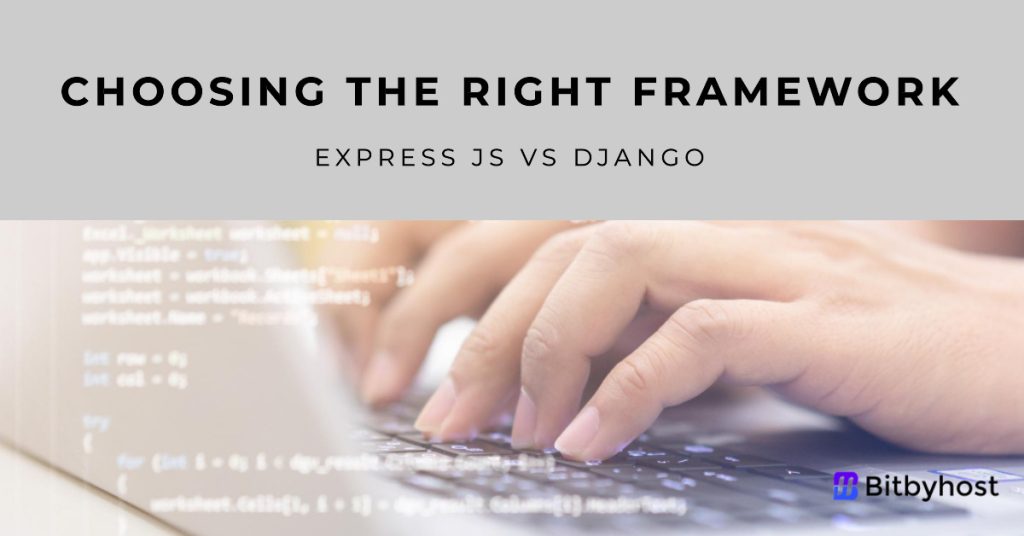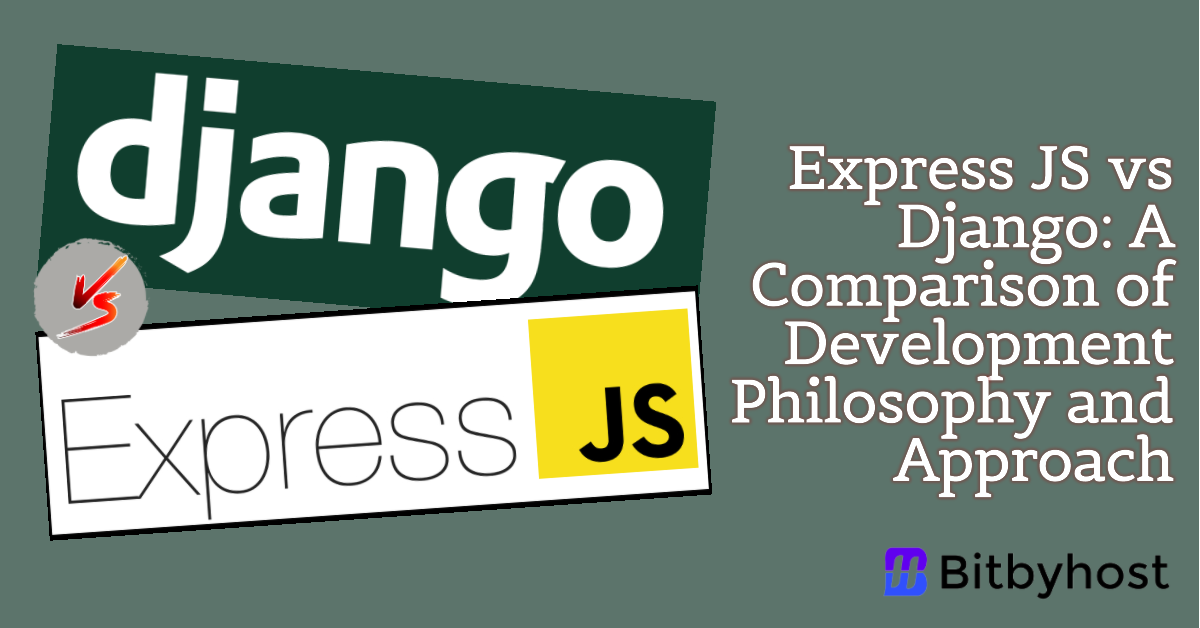Express JS vs Django are both popular web development frameworks known for their versatility and robustness. Express JS is a minimalistic and flexible Node.js framework, while Django is a high-level Python web framework. Understanding the development philosophies and approaches of these frameworks is essential for making an informed decision when choosing the right one for your project.
Understanding Development Philosophies of Express JS and Django
Express JS follows a minimalist approach, providing developers with the freedom to build web applications with minimal restrictions. It encourages simplicity and modularity, allowing developers to choose from a wide range of supported libraries and tools. On the other hand, Django follows the “batteries included” philosophy, offering a comprehensive set of tools and pre-built features for rapid development.
Comparison of Approach in Web Development

Express JS focuses on speed and simplicity, providing developers with the freedom to customize and optimize their applications according to specific needs. It is lightweight and ideal for building small to medium-sized projects quickly. Conversely, Django prioritizes convention over configuration, offering a highly structured and organized approach to web development. It provides a robust framework with built-in features that facilitate scalability and maintainability.
Exploring REST API Development in Express JS and Django
Both Express JS and Django are capable of building RESTful APIs. Express JS provides a minimalistic approach, allowing developers to create APIs using middleware and routing functions. Django, on the other hand, offers a powerful Object-Relational Mapping (ORM) system, making it easier to build APIs with clean and readable code.
Database Integration Strategies in Express JS and Django
Express JS supports a variety of databases and provides developers with the flexibility to choose the most appropriate one for their project. It integrates seamlessly with popular databases like MongoDB, MySQL, and PostgreSQL. Django, on the other hand, comes with a built-in Object-Relational Mapping (ORM) that allows developers to work with databases easily. It provides support for various databases, including PostgreSQL, MySQL, Oracle, and SQLite.
Testing and Debugging Tools for Express JS and Django
Both Express JS and Django offer robust testing and debugging tools to ensure the quality and reliability of web applications. Express JS provides middleware and libraries like Mocha and Chai, which are widely used for testing and debugging purposes. Django has its own testing framework, which includes features like test runners and assertion methods, making it easier to write comprehensive test suites.
Deployment Options: Express JS vs Django
Express JS supports various deployment options, including traditional hosting servers, cloud platforms, and containerization tools like Docker. It provides flexibility in terms of deployment and can be easily integrated into existing infrastructure. Django, on the other hand, offers seamless deployment options with platforms like Heroku, AWS, and Google Cloud. It also supports containerization and provides simplified deployment processes.
Performance Analysis: Express JS vs Django
When it comes to performance, Express JS is known for its speed and scalability. It is built on Node.js, a highly performant runtime environment, and allows developers to write non-blocking, event-driven code. Django, on the other hand, offers excellent performance due to its efficient architectural design and optimization techniques. However, the choice of framework for achieving optimal performance depends on the specific requirements and nature of the project.
Scalability and Security Aspects: Express JS vs Django
Both Express JS and Django can handle scalability effectively. Express JS provides a modular and lightweight structure that allows applications to scale seamlessly. It also integrates well with cloud-based solutions, making it easier to handle increased traffic. Django, on the other hand, offers built-in features like caching, database optimization, and load balancing, ensuring smooth scalability. In terms of security, Django provides comprehensive security features by default, minimizing the risk of common vulnerabilities. Express JS also offers security features but requires additional measures to ensure robust security.
Real-World Use Cases and Examples for Express JS and Django
Express JS has been extensively used in various real-world applications, including content management systems, e-commerce platforms, and APIs. It has gained popularity in building lightweight, fast, and scalable web applications. Django has been widely adopted for creating complex and feature-rich applications, such as social media platforms, news websites, and enterprise-level systems. Its versatility and stability make it a preferred choice for large-scale projects.
Express JS: Overview and Advantages
Introduction to Express JS
Express JS is a minimalistic and fast web application framework developed for Node.js. It provides a robust set of features and a flexible modular structure, making it ideal for building web applications and APIs.
Key Advantages and Characteristics of Express JS
Express JS offers several advantages, including its lightweight nature, minimalistic design, and simplicity. Its modular structure allows developers to choose and integrate only the required components, resulting in faster development and improved performance. Additionally, the vast ecosystem of middleware and libraries available for Express JS provides flexibility and customization options.
Exploring Real-World Use Cases for Express JS
Express JS has been widely used in various real-world use cases, including building Single-Page Applications (SPAs), creating RESTful APIs, and developing real-time applications with WebSockets. It is also commonly used for prototyping and developing small to medium-sized projects quickly.
Comparison of Express JS with Other Node.js Frameworks
Express JS offers a balance between simplicity and flexibility, making it one of the most popular Node.js frameworks. When compared to other Node.js frameworks like Hapi or Koa, Express JS stands out for its extensive community support, mature ecosystem, and ease of learning.
Django: Overview and Advantages
Introduction to Django
Django is a high-level Python web framework known for its efficient design and comprehensive set of features. It follows the Model-View-Controller (MVC) architectural pattern, allowing developers to build complex web applications rapidly.
Key Advantages and Characteristics of Django
Django offers several advantages, including its scalability, security measures, and built-in administrative interface. Its batteries included approach provides developers with a wide range of tools and pre-built functionalities, reducing the need for additional libraries and frameworks.
Real-World Use Cases and Examples for Django
Django has been extensively used in various real-world use cases, including building content management systems, social networking platforms, and data-driven websites. Its versatility and robustness make it suitable for developing complex and large-scale applications.
Comparing Django with Other Python Frameworks
Django stands out among other Python frameworks due to its comprehensive features, scalability, and efficient design. When compared to frameworks like Flask or Pyramid, Django offers a higher level of abstraction and pre-built tools, making it more suitable for large-scale applications with complex requirements.
Express JS vs Django: Choosing the Right Framework

Comparison of Development Philosophies and Approach
Choosing the right framework between Express JS and Django depends on the development philosophy and approach that aligns with the project’s requirements. Express JS offers simplicity, flexibility, and speed, while Django provides structure, scalability, and a comprehensive set of built-in features.
Selecting the Framework Based on REST API Requirements
If the project primarily focuses on building a REST API, both Express JS and Django can fulfill the requirements effectively. Express JS provides a minimalist approach with middleware and routing functions, while Django offers a powerful ORM system for clean API development.
Database Integration Capabilities and Tools
Express JS and Django offer seamless integration with various databases. Express JS supports popular databases like MongoDB, MySQL, and PostgreSQL, providing flexibility to choose the most suitable option. Django comes with a built-in ORM that supports PostgreSQL, MySQL, Oracle, and SQLite.
Analyzing Testing and Debugging Features
Both Express JS and Django offer robust testing and debugging features. Express JS provides middleware and libraries like Mocha and Chai, while Django comes with its own testing framework. Choosing the framework depends on personal preferences and the complexity of testing requirements.
Deployment Options for Express JS and Django
Express JS supports various deployment options, including traditional hosting servers, cloud platforms, and containerization tools like Docker. Django offers seamless deployment with platforms like Heroku, AWS, and Google Cloud. Both frameworks provide flexibility in deployment based on project requirements.
Performance and Scalability Evaluation
The performance and scalability evaluation between Express JS and Django depend on the specific project requirements and nature. Express JS, built on Node.js, provides speed and scalability with its event-driven architecture, while Django offers optimization techniques and a highly efficient design.
Ensuring Security: Express JS vs Django
Both Express JS and Django offer security features, but Django provides comprehensive security measures out of the box. Express JS requires additional measures to ensure robust security, such as input validation, middleware usage, and adherence to security best practices.
Deciding the Suitable Framework for Your Project
Choosing the suitable framework between Express JS and Django depends on various factors, including the project requirements, development team expertise, scalability needs, and specific functionalities needed. It is crucial to evaluate these factors and select the framework that best aligns with the project goals and priorities.
Answering the Questions
Is Django better than Express JS?
Comparing Django and Express JS in terms of superiority is subjective, as each framework has its own strengths and weaknesses. Django offers a comprehensive set of built-in features and follows a structured approach, making it ideal for large-scale projects. On the other hand, Express JS provides simplicity, flexibility, and speed, making it suitable for rapid development and smaller projects. The choice between the two depends on the specific project requirements and development philosophy preferred.
Is Django better than NodeJS?
Django and Node.js are two different technologies used for web development. Django is a high-level Python web framework, while Node.js is a runtime environment for JavaScript. Comparing the two is not appropriate, as they serve different purposes. Django provides a complete framework for building web applications with Python, while Node.js allows developers to use JavaScript on the server-side. The choice between Django and Node.js depends on the project requirements, existing tech stack, and development team expertise.
Can Django replace NodeJS?
Django and Node.js serve different purposes and cannot be directly compared as replacements for each other. Django is a Python web framework that provides a complete solution for building web applications, while Node.js is a JavaScript runtime that allows server-side development. While Django can be used for various development needs, including web applications, Node.js provides flexibility in terms of scalability and real-time applications. The choice between Django and Node.js depends on the specific project requirements and the development team’s expertise.
What is faster than Express NodeJS?
Express JS, being built on Node.js, is known for its speed and scalability. Comparing it with something that is faster is difficult since it already offers optimal performance. However, other Node.js frameworks like Hapi or Koa can offer similar performance capabilities. The choice of framework depends on specific project requirements, development team expertise, and desired architecture.







